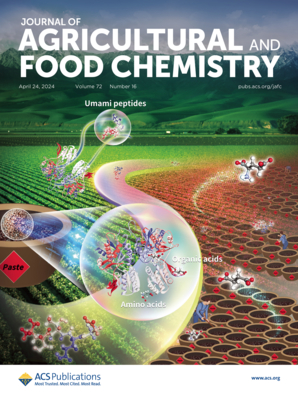诱导性倍半萜合成酶和苯丙类植物抗菌素协同促进茄子对疫霉的非宿主抗性
IF 6.2
1区 农林科学
Q1 AGRICULTURE, MULTIDISCIPLINARY
引用次数: 0
摘要
晚疫病是马铃薯(Solanum tuberosum)和番茄(Solanum lycopersicum)的一种毁灭性疾病。相比之下,茄子(Solanum melongena)是晚疫病的非寄主物种,尽管其抗性的机制仍然难以捉摸。在本研究中,比较转录组学分析表明,编码倍半萜合成酶的SmTPS28作为转基因表达可以增强马铃薯对晚疫病的抗性。进一步的靶向代谢组学分析表明,在茄子叶片中外源施用丁香醛(一种苯丙类植物抗菌素)可以诱导免疫相关基因表达,并保护马铃薯免受晚疫病的侵害。有趣的是,丁香醛对smtps28过表达的马铃薯植株的保护作用比对其野生型祖体细胞的保护作用更大,这表明这两种成分在非寄主抗性中具有功能协同作用。这些发现揭示了茄子对晚疫病的非寄主抗性机制的新视角,并有助于开发可持续晚疫病管理的新工具和新技术。本文章由计算机程序翻译,如有差异,请以英文原文为准。
Inducible Sesquiterpene Synthase and a Phenylpropanoid Phytoalexin of Eggplants (Solanum melongena) Synergistically Promote Nonhost Resistance against Phytophthora infestans.
Late blight caused by Phytophthora infestans is a devastating disease on potatoes (Solanum tuberosum) and tomatoes (Solanum lycopersicum). By contrast, eggplants (Solanum melongena) are a nonhost species of late blight, though the mechanisms underlying their resistance remain elusive. In this study, comparative transcriptomics analyses revealed that a sesquiterpene synthase-encoding SmTPS28 could enhance potato resistance against late blight when expressed as a transgene. Further targeted metabolomics analyses showed that syringaldehyde, a phenylpropanoid phytoalexin in eggplant leaves, could induce immune-related gene expression and protect potatoes from late blight when exogenously applied prior to pathogen exposure. Intriguingly, syringaldehyde exhibited a greater protective efficiency on SmTPS28-overexpressing potato plants than on their wild-type progenitors, suggesting functional synergism between these two components of nonhost resistance. These findings reveal novel perspectives of the nonhost resistance mechanisms of eggplants against late blight, and could facilitate the development of new tools and technologies for sustainable late blight management.
求助全文
通过发布文献求助,成功后即可免费获取论文全文。
去求助
来源期刊
CiteScore
9.90
自引率
8.20%
发文量
1375
审稿时长
2.3 months
期刊介绍:
The Journal of Agricultural and Food Chemistry publishes high-quality, cutting edge original research representing complete studies and research advances dealing with the chemistry and biochemistry of agriculture and food. The Journal also encourages papers with chemistry and/or biochemistry as a major component combined with biological/sensory/nutritional/toxicological evaluation related to agriculture and/or food.

 求助内容:
求助内容: 应助结果提醒方式:
应助结果提醒方式:


